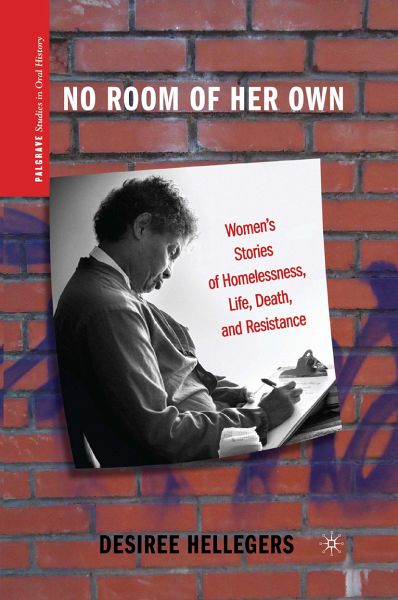
D. Hellegers
eBook, PDF
No Room of Her Own (eBook, PDF)
Women's Stories of Homelessness, Life, Death, and Resistance

PAYBACK Punkte
22 °P sammeln!






This oral history collection brings together extended interviews with fifteen women, illuminating the part that gender roles play in ensnaring women in cycles of domestic abuse and homelessness and highlighting the physical stresses. It also challenges liberal myths about homeless people, and homeless women in particular.
Dieser Download kann aus rechtlichen Gründen nur mit Rechnungsadresse in A, B, BG, CY, CZ, D, DK, EW, E, FIN, F, GR, HR, H, IRL, I, LT, L, LR, M, NL, PL, P, R, S, SLO, SK ausgeliefert werden.
DESIREE HELLEGERS is Co-Director of the Center for Social and Environmental Justice, Associate Chair and Associate Professor of English at Washington State University, Vancouver, Canada. She is an active member of various advocacy organizations and her writing has appeared in such publications as Counterpunch.
Produktdetails
- Verlag: Palgrave Macmillan US
- Seitenzahl: 218
- Erscheinungstermin: 30. April 2016
- Englisch
- ISBN-13: 9780230339200
- Artikelnr.: 44962100
"No Room of her Own will take its place next to Liebow's Tell Them Who I Am as a definitive contemporary human document on the lives of homeless women." Mitchell Duneier, Maurice P. During Professor of Sociology, Princeton University"Some of my deepest conversations have been with wise homeless sisters of all colors on the underside of America - yet they have a rich understanding of America! Don't miss this book!" Cornel West, Princeton University"Heartbreaking and inspiring stories of courageous women enduring and triumphing over adversity few of us can imagine. Desiree Hellegers brilliantly collates and connects the stories of disparate homeless women. We learn much about these citizens with no addresses. They have been studied to death
Mehr anzeigen
but rarely do we hear their voices. Hellegers skillfully and with compassion weaves the tapestry of these women s testimonies. From Sweet Pea to Debra and Marlowe, their accounts of survival and dignity reveal hidden truths of gender relations and our political and social culture. No Room of Her Own breaks the silences surrounding the national disgrace of homelessness. These women must be heard." David Barsamian, founder and director of Alternative Radio "After reading No Room of Her Own, I m more convinced than ever that unless we bend toward justice, years hence, our children will look back upon current policies - that are producing poverty and homelessness alongside peopleless homes - as a societal experiment that is far worse than theTuskegee study, in which the ravages of syphilis were studied while the individuals were left untreated." Stephen Bezruchka M.D., M.P.H., School of Public Health, University of Washington"Hellegers carefully and contextually places the reader into the individual lives of un-housed women who unmistakably form the very subtext for social justice." Neil J. Donovan, Executive Director, National Coalition for the Homeless
"No Room of Her Own is a gift to readers who want to understand the lives of women who have no home. Hellegers provides a platform for each woman to tell her story in her own vivid, heart wrenching language. As I read the book I felt as if I trudged uphill with each woman as she searched for a place to shower, a chance at a job a safe bed - or even a doorway - for the night. Any image I had of homelessness as a position of inert helplessness has been dispelled by reading the stories of women on the move to improve their situations. Violence, depression and anger are potent parts of the women s struggles. External threats to safety and health frequently erode confidence. But hope and courage regularly rise up to triumph over despair." Ginny Nicarthy, author of Getting Free: You Can End Abuse and Take Back Your Life "The reality that sings out from Desiree Hellegers' remarkable book is that women who lack a roof to sleep under at night are not lacking in competence, will-power, a way with words and a generous spirit of activism. The first-hand stories gathered here, framed by Hellegers' cogently political introduction, show how in the USA's grossly class-divided, racist and sexist society, housing is not a right but a privilege. Homelessness is a punishment for being already disadvantaged. No Room of Her Own will be an inspiration to activist women, both homeless and housed." Cynthia Cockburn, feminist research and writer, member of Women in Black London. Author of From Where We Stand: War, Women's Activism and Feminist Analysis (2007)"Desiree Hellegers presents fifteen heart-wrenching portraits of the lives of homeless and formerly homeless women. These women s stories are not sanitized to elicit sympathy from the reader. Rather, Hellegers offers us multidimensional narratives that resist the objectifying tendencies of other portrayals of the un-housed. In doing so, she aids the women s persistent struggle to assert value in their lives in the midst of
"No Room of Her Own is a gift to readers who want to understand the lives of women who have no home. Hellegers provides a platform for each woman to tell her story in her own vivid, heart wrenching language. As I read the book I felt as if I trudged uphill with each woman as she searched for a place to shower, a chance at a job a safe bed - or even a doorway - for the night. Any image I had of homelessness as a position of inert helplessness has been dispelled by reading the stories of women on the move to improve their situations. Violence, depression and anger are potent parts of the women s struggles. External threats to safety and health frequently erode confidence. But hope and courage regularly rise up to triumph over despair." Ginny Nicarthy, author of Getting Free: You Can End Abuse and Take Back Your Life "The reality that sings out from Desiree Hellegers' remarkable book is that women who lack a roof to sleep under at night are not lacking in competence, will-power, a way with words and a generous spirit of activism. The first-hand stories gathered here, framed by Hellegers' cogently political introduction, show how in the USA's grossly class-divided, racist and sexist society, housing is not a right but a privilege. Homelessness is a punishment for being already disadvantaged. No Room of Her Own will be an inspiration to activist women, both homeless and housed." Cynthia Cockburn, feminist research and writer, member of Women in Black London. Author of From Where We Stand: War, Women's Activism and Feminist Analysis (2007)"Desiree Hellegers presents fifteen heart-wrenching portraits of the lives of homeless and formerly homeless women. These women s stories are not sanitized to elicit sympathy from the reader. Rather, Hellegers offers us multidimensional narratives that resist the objectifying tendencies of other portrayals of the un-housed. In doing so, she aids the women s persistent struggle to assert value in their lives in the midst of
Schließen
Für dieses Produkt wurde noch keine Bewertung abgegeben. Wir würden uns sehr freuen, wenn du die erste Bewertung schreibst!
Eine Bewertung schreiben
Eine Bewertung schreiben
Andere Kunden interessierten sich für











